Module 9 Unit 1 He left school and began work at the age of twelve. 课件 2023-2024学年初中英语外研版七年级下册(22张PP
文档属性
| 名称 | Module 9 Unit 1 He left school and began work at the age of twelve. 课件 2023-2024学年初中英语外研版七年级下册(22张PP |
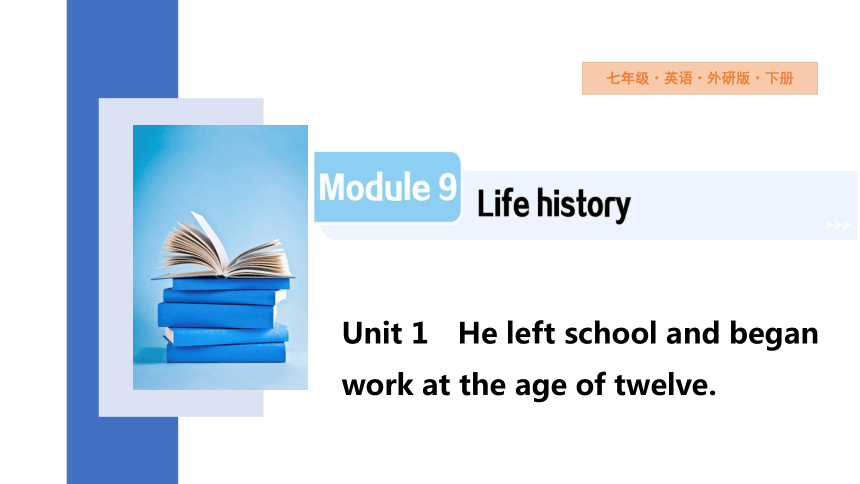
|
|
| 格式 | pptx | ||
| 文件大小 | 731.5KB | ||
| 资源类型 | 教案 | ||
| 版本资源 | 外研版 | ||
| 科目 | 英语 | ||
| 更新时间 | 2024-02-20 00:00:00 | ||
图片预览

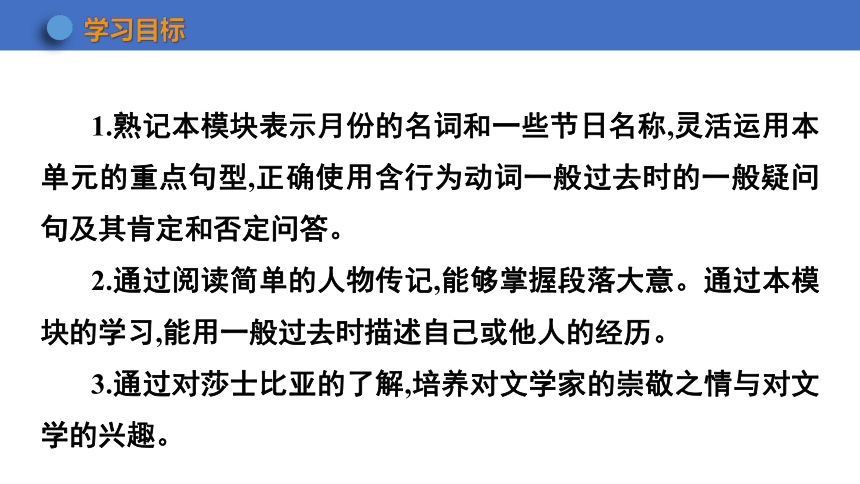
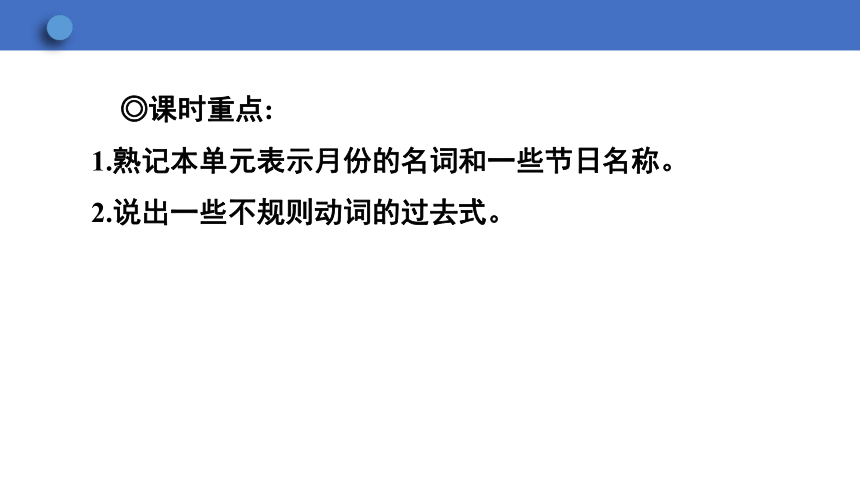
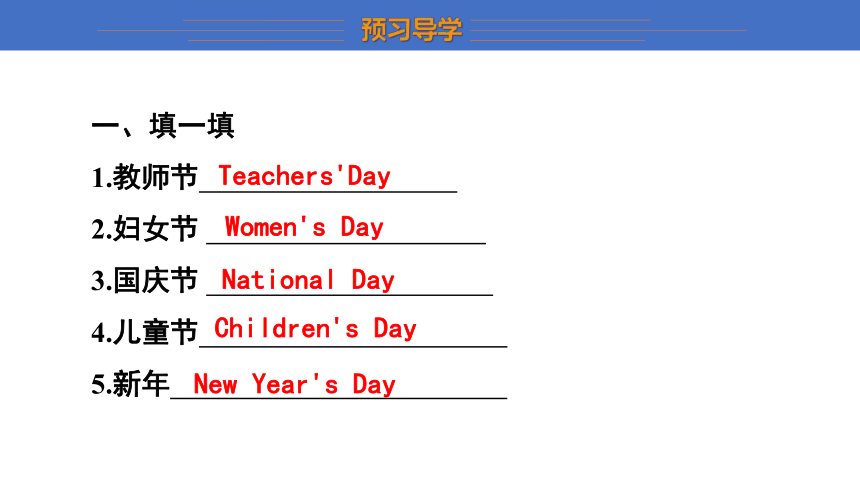
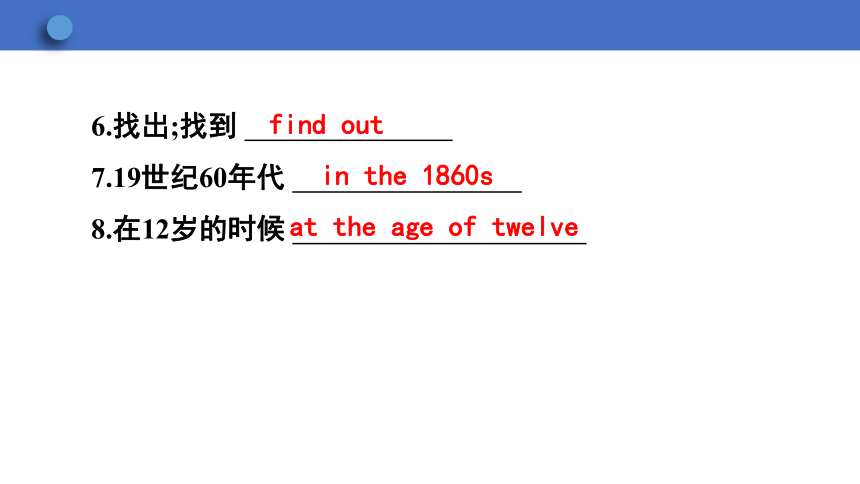
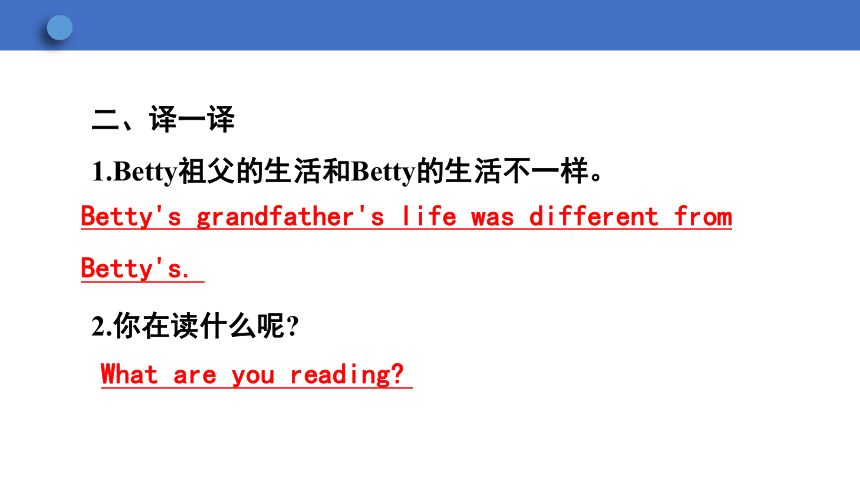
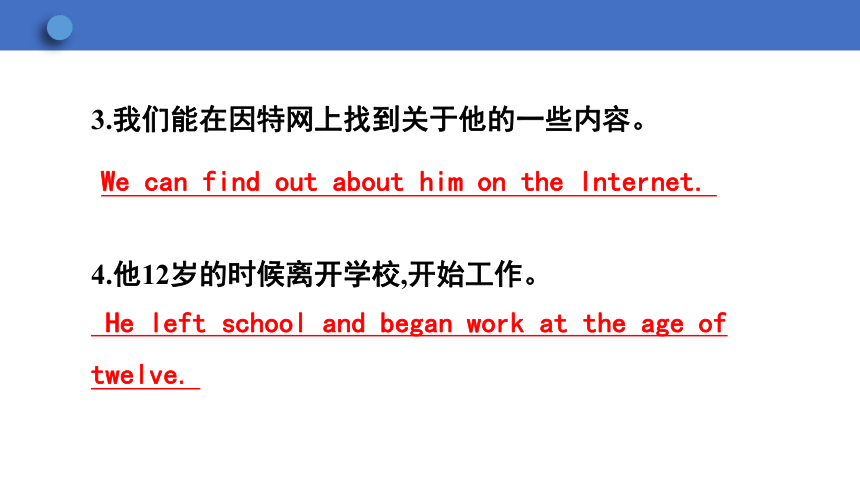
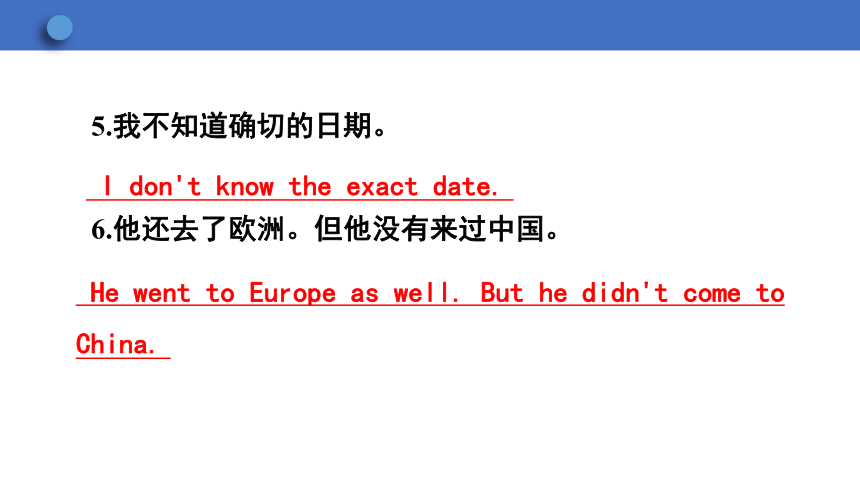
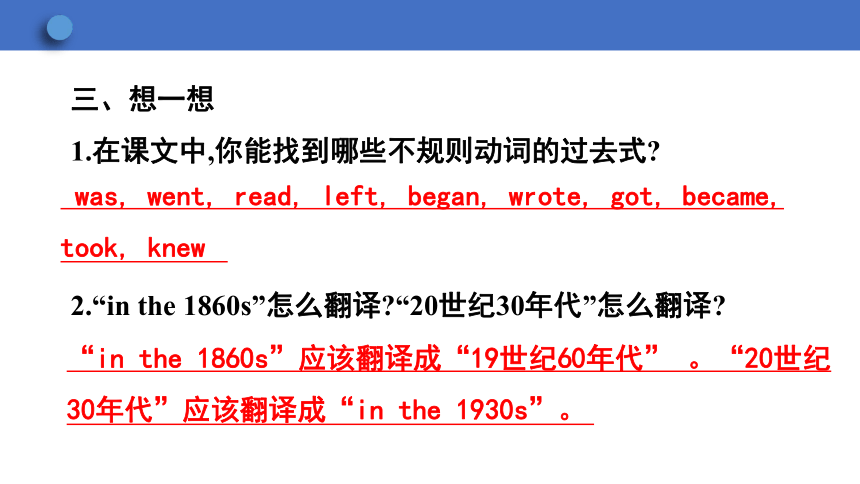
文档简介
(共22张PPT)
七年级·英语·外研版·下册
Unit 1 He left school and began
work at the age of twelve.
1.熟记本模块表示月份的名词和一些节日名称,灵活运用本单元的重点句型,正确使用含行为动词一般过去时的一般疑问句及其肯定和否定问答。
2.通过阅读简单的人物传记,能够掌握段落大意。通过本模块的学习,能用一般过去时描述自己或他人的经历。
3.通过对莎士比亚的了解,培养对文学家的崇敬之情与对文学的兴趣。
◎课时重点:
1.熟记本单元表示月份的名词和一些节日名称。
2.说出一些不规则动词的过去式。
一、填一填
1.教师节
2.妇女节
3.国庆节
4.儿童节
5.新年
Teachers'Day
Women's Day
National Day
Children's Day
New Year's Day
6.找出;找到
7.19世纪60年代
8.在12岁的时候
find out
in the 1860s
at the age of twelve
二、译一译
1.Betty祖父的生活和Betty的生活不一样。
2.你在读什么呢
Betty's grandfather's life was different from Betty's.
What are you reading
3.我们能在因特网上找到关于他的一些内容。
4.他12岁的时候离开学校,开始工作。
We can find out about him on the Internet.
He left school and began work at the age of twelve.
5.我不知道确切的日期。
6.他还去了欧洲。但他没有来过中国。
I don't know the exact date.
He went to Europe as well. But he didn't come to China.
三、想一想
1.在课文中,你能找到哪些不规则动词的过去式
2.“in the 1860s”怎么翻译 “20世纪30年代”怎么翻译
was, went, read, left, began, wrote, got, became, took, knew
“in the 1860s”应该翻译成“19世纪60年代” 。“20世纪30年代”应该翻译成“in the 1930s”。
1.朗读下列单词。
January February March April May June
July August September October November December
熟记12个月份的英语名称
2.小组同学间进行口语练习。
完成任务所需的语言结构:
A:Which month is the first in a year
B:January.
A:Which month is the last in a year
B:December.
A:Which month is before/after...
B:It's...
这些节日分别在哪个月份
1.Teachers' Day
2.Women's Day
3.Christmas
4.National Day
熟记节日名称
in September
in March
in December
in October
5.Children ' s Day
6.New Year ' s Day
7.May Day
8.Spring Festival
in June
in January
in May
in January or February
仔细阅读课本第3部分的对话,回答下列问题。
1.What is Tony doing
2.When was Mark Twain born
阅读练习
He is reading Tom Sawyer.
In 1835.
3.Did Mark Twain come to China
No, he didn't.
●We can find out about him on the Internet.我们能在因特网上找到关于他的一些内容。
find out 意为“弄明白;搞清楚;查明”,也表示在书中或者文章中找到自己所需要的信息。例如:
The teacher wanted to find out who had broken the door.老师想要查明是谁摔坏了门。
You could find out the answers to these questions from the book.你能从书中找到这些问题的答案。
find强调在经过寻找后的结果(找到或找不到),又可以表示(偶然地)发现。例如:
I found a watch on the road.我在路上发现了一个手表。
I found my cat asleep in my bed.我发现我的猫在床上睡着了。
做一做:单项选择。
( )You will what kind of person he is some day.
A.find B.find out
C.observe D.discover
B
●He went to Europe as well. 他也去过欧洲。
as well 意为“也”,通常用在肯定句的句末,前面无逗号。例如:
I can do it as well.我也能做。
also用于肯定句,既可表示两人干了同样的事,也可表示一个人干了两件事,通常位于be动词、助动词或情态动词之后,行为动词之前。例如:
He is good at English. He is also good at Japanese.他擅长英语,也擅长日语。
I also want some tea.我也想要喝茶。
too也用于肯定句,一般放在句末,前面用逗号隔开。例如:
He studies hard and I study hard, too.他学习努力,我学习也努力。
either用于否定句,而且只能放在句末,前面用逗号隔开。例如:
He didn‘t know it. I didn’t know it, either.他不知道,我也不知道。
做一做:用too、also、either或as well填空。
1.I'll go to see the film, .
2.If you don't come here, I shouldn't, .
3.Jack can speak Chinese, and his brother can
speak Chinese.
4.He knows Chinese .
too
either
also
as well / too
七年级·英语·外研版·下册
Unit 1 He left school and began
work at the age of twelve.
1.熟记本模块表示月份的名词和一些节日名称,灵活运用本单元的重点句型,正确使用含行为动词一般过去时的一般疑问句及其肯定和否定问答。
2.通过阅读简单的人物传记,能够掌握段落大意。通过本模块的学习,能用一般过去时描述自己或他人的经历。
3.通过对莎士比亚的了解,培养对文学家的崇敬之情与对文学的兴趣。
◎课时重点:
1.熟记本单元表示月份的名词和一些节日名称。
2.说出一些不规则动词的过去式。
一、填一填
1.教师节
2.妇女节
3.国庆节
4.儿童节
5.新年
Teachers'Day
Women's Day
National Day
Children's Day
New Year's Day
6.找出;找到
7.19世纪60年代
8.在12岁的时候
find out
in the 1860s
at the age of twelve
二、译一译
1.Betty祖父的生活和Betty的生活不一样。
2.你在读什么呢
Betty's grandfather's life was different from Betty's.
What are you reading
3.我们能在因特网上找到关于他的一些内容。
4.他12岁的时候离开学校,开始工作。
We can find out about him on the Internet.
He left school and began work at the age of twelve.
5.我不知道确切的日期。
6.他还去了欧洲。但他没有来过中国。
I don't know the exact date.
He went to Europe as well. But he didn't come to China.
三、想一想
1.在课文中,你能找到哪些不规则动词的过去式
2.“in the 1860s”怎么翻译 “20世纪30年代”怎么翻译
was, went, read, left, began, wrote, got, became, took, knew
“in the 1860s”应该翻译成“19世纪60年代” 。“20世纪30年代”应该翻译成“in the 1930s”。
1.朗读下列单词。
January February March April May June
July August September October November December
熟记12个月份的英语名称
2.小组同学间进行口语练习。
完成任务所需的语言结构:
A:Which month is the first in a year
B:January.
A:Which month is the last in a year
B:December.
A:Which month is before/after...
B:It's...
这些节日分别在哪个月份
1.Teachers' Day
2.Women's Day
3.Christmas
4.National Day
熟记节日名称
in September
in March
in December
in October
5.Children ' s Day
6.New Year ' s Day
7.May Day
8.Spring Festival
in June
in January
in May
in January or February
仔细阅读课本第3部分的对话,回答下列问题。
1.What is Tony doing
2.When was Mark Twain born
阅读练习
He is reading Tom Sawyer.
In 1835.
3.Did Mark Twain come to China
No, he didn't.
●We can find out about him on the Internet.我们能在因特网上找到关于他的一些内容。
find out 意为“弄明白;搞清楚;查明”,也表示在书中或者文章中找到自己所需要的信息。例如:
The teacher wanted to find out who had broken the door.老师想要查明是谁摔坏了门。
You could find out the answers to these questions from the book.你能从书中找到这些问题的答案。
find强调在经过寻找后的结果(找到或找不到),又可以表示(偶然地)发现。例如:
I found a watch on the road.我在路上发现了一个手表。
I found my cat asleep in my bed.我发现我的猫在床上睡着了。
做一做:单项选择。
( )You will what kind of person he is some day.
A.find B.find out
C.observe D.discover
B
●He went to Europe as well. 他也去过欧洲。
as well 意为“也”,通常用在肯定句的句末,前面无逗号。例如:
I can do it as well.我也能做。
also用于肯定句,既可表示两人干了同样的事,也可表示一个人干了两件事,通常位于be动词、助动词或情态动词之后,行为动词之前。例如:
He is good at English. He is also good at Japanese.他擅长英语,也擅长日语。
I also want some tea.我也想要喝茶。
too也用于肯定句,一般放在句末,前面用逗号隔开。例如:
He studies hard and I study hard, too.他学习努力,我学习也努力。
either用于否定句,而且只能放在句末,前面用逗号隔开。例如:
He didn‘t know it. I didn’t know it, either.他不知道,我也不知道。
做一做:用too、also、either或as well填空。
1.I'll go to see the film, .
2.If you don't come here, I shouldn't, .
3.Jack can speak Chinese, and his brother can
speak Chinese.
4.He knows Chinese .
too
either
also
as well / too
同课章节目录
- Module 1 Lost and found
- Unit 1 Whose bag is this?
- Unit 2 Are they yours?
- Unit 3 Language in use
- Module 2 What can you do ?
- Unit 1 I can play the piano
- Unit 2 I can run really fast
- Unit 3 Language in use
- Module 3 Making plans
- Unit 1 What are you going to do at the weekends?
- Unit 2 We're going to cheer the players.
- Unit 3 Language in use
- Module 4 Life in the future
- Unit 1 Everyone will study at home
- Unit 2 Every family will have a small plane.
- Unit 3 Language in use
- Module 5 Shopping
- Unit 1 What can I do for you?
- Unit 2 You can buy everything on the Internet
- Unit 3 Language in use
- Module 6 Around town
- Unit 1 Could you tell me how to get to the Nationa
- Unit 2 The London Eye is on your right.
- Unit 3 Language in use
- Revision module A
- Module 7 My past life
- Unit 1 I was born in a small village.
- Unit 2 I was born in Quincy.
- Unit 3 Language in use
- Module 8 Story time
- Unit 1 Once upon a time….
- Unit 2 Goldilocks hurried out of the house.
- Unit 3 Language in use
- Module 9 Life history
- Unit 1 He left school and began work at the age of
- Unit 2 He decided to be an actor.
- Unit 3 Language in use
- Module 10 A holiday journey
- Unit 1 What did you do?
- Unit 2 This morning we took a walk.
- Unit 3 Language in use
- Module 11 Body language
- Unit 1 They touch noses!
- Unit 2 Here are some ways to welcome them.
- Unit 3 Language in use
- Module 12 Western music
- Unit 1 It's so beautiful!
- Unit 2 Vienna is the centre of European classical
- Unit 3 Language in use
- Revision module B
